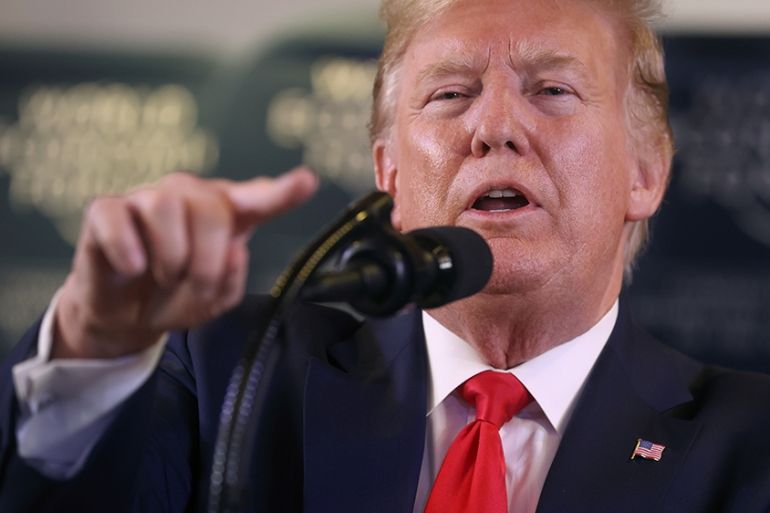Trump to EU: Agree a trade deal or face ‘very high tariffs’
Trump tells CNBC he’ll slap punitive levies on EU auto imports if the bloc doesn’t strike a trade deal with the US.

The European Union should be accustomed by now to dealing with threats from the United States to slap tariffs on the bloc’s auto imports if it does not bend to Washington’s will.
On Wednesday, President Donald Trump was at it again, raising the spectre of punishing the EU’s auto sector if the bloc doesn’t agree to a trade deal with the US.
Keep reading
list of 3 itemsUS to pressure UK to stop using Huawei 5G equipment: Report
US and France set Davos deadline to resolve digital tax spat
“I met with the new head of the European Commission, who’s terrific. And I had a great talk. But I said, ‘look, if we don’t get something, I’m going to have to take action’ and the action will be very high tariffs on their cars and on other things that come into our country,” Trump told business news network CNBC in an interview from the World Economic Forum in Davos, Switzerland.
Trump told CNBC that the EU had to make a deal on trade. “They have no choice,” he said.
In a separate interview in Davos with Fox Business News, Trump said the tariffs on EU cars could amount to 25 percent.
Trump has delayed pulling the trigger on such tariffs a number of times, but has invoked them as a possible bid to gain leverage in trade negotiations.
The threat is designed to get Europe to sit up and listen. Cars are a vital export for the EU, especially Germany, which is the eurozone’s largest economy. Last year, the block’s manufacturing sector sank into recession, largely as a result of waning export demand for automobiles.
And it’s not just the EU’s automotive sector that Trump has targeted for possible punitive measures.
The US has also threatened duties of up to 100 percent on French goods, from champagne to handbags, over Paris’ planned digital services tax that Washington said harms US tech companies.
On Wednesday, French Finance Minister Bruno Le Maire said he had agreed with US Treasury Secretary Steven Mnuchin in Davos that France would not require companies to pay its digital tax this year and that Mnuchin had agreed to suspend the tariff threat in the meantime.
Tensions on other trade war fronts have also showed signs this month of easing.
The United States signed a phase one trade deal with China in January, soothing some of the worries that have hampered the world economy by disrupting supply chains and creating uncertainty among businesses and investors.
Asked if a trade pact with the United Kingdom could come next, Trump told CNBC he was ready to make a deal with British Prime Minister Boris Johnson.
“Boris and I are friends, and he wants to make a deal, and that’s OK with me,” he said.
The UK is due to leave the EU at the end of January, the Johnson has stated that one of the main advantages of being outside the bloc would be the ability for the UK to negotiate its own trade deals, including with the US.
“We’re starting. We’ve already started negotiating” with the UK, Trump said.